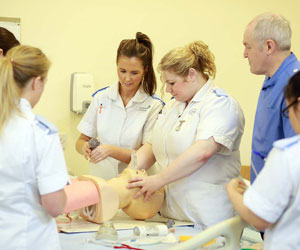Features of the programme:
- The programme is 50% theory and 50% practice within Community Learning Disability Nursing under the supervision of a qualified Practice Assessor and Practice Supervisor
- The programme can be studied full time over 52 weeks or part time over 104 weeks / Distance Learning
- The programme can be studied at BSc (Hons) if you hold a Diploma or at Post-Graduate Diploma if you hold a degree (1st or 2:1 classification) and wants to advance to level 7 (Master’s level)
- Successful students will have a specialist practitioner qualification recorded with the NMC
Staff highly regarded by students and practice placement partners for our teaching in this area, the University of Cumbria has a strong reputation for its Community Learning Disability Nursing training. You will work with skilled academics who have held senior roles in CLDN.
Graduate destinations
Successful students have typically progressed their career into Community Learning Disability Nursing Sister/Charge Nurse; Team Leader; Clinical Service Manager with some students choosing to develop their careers within other NHS specialist roles.






